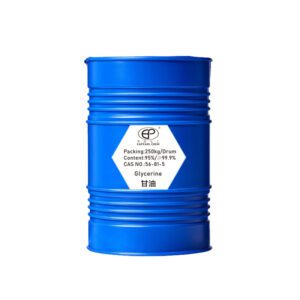Introduction
Batteries play a crucial role in our daily lives, powering various devices, from smartphones to electric vehicles. However, extreme temperatures can affect battery performance and lifespan. Antifreeze agents are used to protect the battery fluid from overcoming this challenge. One such agent is propylene glycol, which offers several advantages in battery applications. This article will explore how propylene glycol can be used as battery fluid antifreeze and its benefits.
What is Propylene Glycol?
Propylene glycol is a versatile organic compound commonly used in various industries. It is a colorless and odorless liquid with a thick, syrupy consistency. Propylene glycol is known for its ability to dissolve many substances and its low toxicity, making it suitable for different applications, including food, cosmetics, pharmaceuticals, and automotive products.
Properties of Propylene Glycol
Propylene glycol possesses several properties, making it an excellent choice for battery fluid antifreeze. Firstly, it has a low freezing point, allowing it to remain liquid even at shallow temperatures. Additionally, it has a high boiling point, enabling it to withstand high temperatures without evaporating. These properties ensure the battery fluid remains stable regardless of external conditions.
Battery Fluid and Its Importance
Battery fluid, also known as electrolyte, is a vital component of batteries. It conducts electricity between the battery’s positive and negative terminals, facilitating the chemical reactions that generate electrical energy. The electrolyte’s stability and conductivity directly impact a battery’s performance and lifespan. Therefore, maintaining the proper functioning of battery fluid is crucial for efficient battery operation.
Challenges with Battery Fluid in Extreme Temperatures
Extreme temperatures, whether excessively cold or hot, challenge battery performance. The electrolyte can freeze in cold environments, reducing battery efficiency or even causing irreversible damage. On the other hand, high temperatures can accelerate the electrolyte’s evaporation, causing a loss of fluid and compromising the battery’s functionality. To address these challenges, antifreeze agents are utilized.
Propylene Glycol as an Antifreeze Agent
Propylene glycol is an effective antifreeze agent for battery fluid, ensuring the electrolyte remains functional even in extreme temperatures. The mechanism behind propylene glycol’s antifreeze properties lies in its ability to lower the freezing point of the fluid. When mixed with the battery fluid, propylene glycol forms a solution with a lower freezing point than the original electrolyte, thus preventing solidifying.
Benefits of Propylene Glycol as Battery Fluid Antifreeze
Utilizing propylene glycol as a battery fluid antifreeze offers several benefits. Firstly, it improves the battery’s cold-cranking performance by preventing freezing, allowing it to deliver power even in frigid conditions. Secondly, propylene glycol’s high boiling point enhances the battery’s thermal stability, reducing the risk of electrolyte evaporation in high-temperature environments. Moreover, it provides a protective layer on battery components, preventing corrosion and extending the battery’s lifespan.
Application of Propylene Glycol in Batteries
Propylene glycol finds application in various types of batteries, including automotive, industrial, and renewable energy storage batteries.
Automotive Batteries
In automotive batteries, propylene glycol ensures reliable performance in extreme weather conditions. It safeguards the battery against freezing during winter, preventing damage and enabling smooth engine starts. Additionally, it helps maintain optimal battery function during hot summers by reducing fluid evaporation.
Industrial Batteries
Industrial batteries, such as those used in forklifts and heavy machinery, face demanding operating conditions. Propylene glycol is a robust antifreeze agent, ensuring these batteries can operate efficiently in cold and hot environments. Propylene glycol helps maintain consistent power output and prolongs battery life by mitigating the effects of temperature extremes.
Renewable Energy Storage Batteries
With the growing adoption of renewable energy sources, energy storage batteries have become crucial for storing excess energy from solar panels or wind turbines. Even in challenging climates, propylene glycol helps these batteries withstand temperature fluctuations, ensuring reliable energy storage and discharge capabilities.
Precautions and Safety Considerations
While propylene glycol is considered safe for use in battery applications, it is essential to handle it with care. When working with propylene glycol, individuals should wear appropriate protective gear, such as gloves and goggles, to avoid skin and eye contact. Furthermore, it should be stored in a cool, well-ventilated area away from heat sources and open flames.
Conclusion
Propylene glycol is an excellent antifreeze agent for battery fluid, offering numerous benefits regarding temperature stability and extended battery life. Its ability to lower the freezing point and raise the boiling point of battery fluid ensures optimal performance in extreme weather conditions. Using propylene glycol, batteries in automotive, industrial, and renewable energy storage applications can deliver reliable power and withstand temperature fluctuations.
FAQs
1. Is propylene glycol safe for battery applications?
– Yes, propylene glycol is considered safe for use in battery applications. However, proper precautions should be taken during handling and storage.
2. Can propylene glycol be mixed with other antifreeze agents?
– Mixing propylene glycol with other antifreeze agents is generally not recommended as it may affect its effectiveness and properties.
3. Does propylene glycol require any unique disposal methods?
– Propylene glycol should be disposed of according to local regulations and guidelines to ensure environmental safety.
4. Can propylene glycol be used in lithium-ion batteries?
– Yes, propylene glycol can be used in lithium-ion batteries as an antifreeze agent to enhance their performance in extreme temperatures.
5. Are there any alternatives to propylene glycol for battery fluid antifreeze?
– Yes, alternative antifreeze agents are available, but propylene glycol is widely used due to its effectiveness, safety, and versatility.








